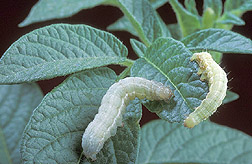This page has been archived and is being provided for reference purposes only. The page is no longer being updated, and therefore, links on the page may be invalid.
|
Selenium May Boost Insect Immunity
By Laura McGinnisMay 31, 2006
Selenium could play a key role in effective integrated pest-management, according to Agricultural Research Service (ARS) scientists with the Biological Control of Insects Research Laboratory in Columbia, Mo.
Insect biochemist Kent Shelby and insect virologist Holly Popham studied two pest moths—the cabbage looper and tobacco budworm—raised on artificial diets that included higher-than-average levels of selenium.
High levels of selenium are toxic to pest and beneficial insects alike. But the researchers' results suggest that moderate dietary levels of selenium may strengthen insect immunity. That, in turn, could reduce the effectiveness of microbial biological control agents used against them.
Shelby and Popham found that increasing the amount of selenium in the moths' diets raised their whole-body selenium levels. They also found that insects with higher selenium levels demonstrated greater resistance to baculoviruses—a group of viruses that cause insects to sicken, stop eating and die.
If selenium boosts pest insects' immunity, it could decrease the effectiveness of baculoviruses as a tool to control and reduce their populations.
According to Shelby and Popham, dietary levels of selenium and other micronutrients could influence insects' response to some integrated pest-management practices. Selenium application, for example, is sometimes used as a control agent, but this research suggests that an insufficient dose might be benefiting the very insects it's supposed to control.
This research may explain why a baculovirus infection would be fatal in one area, but not another. Further research could lead to better-informed pest-management recommendations for crop growers.
ARS is the U.S. Department of Agriculture's chief scientific research agency.

